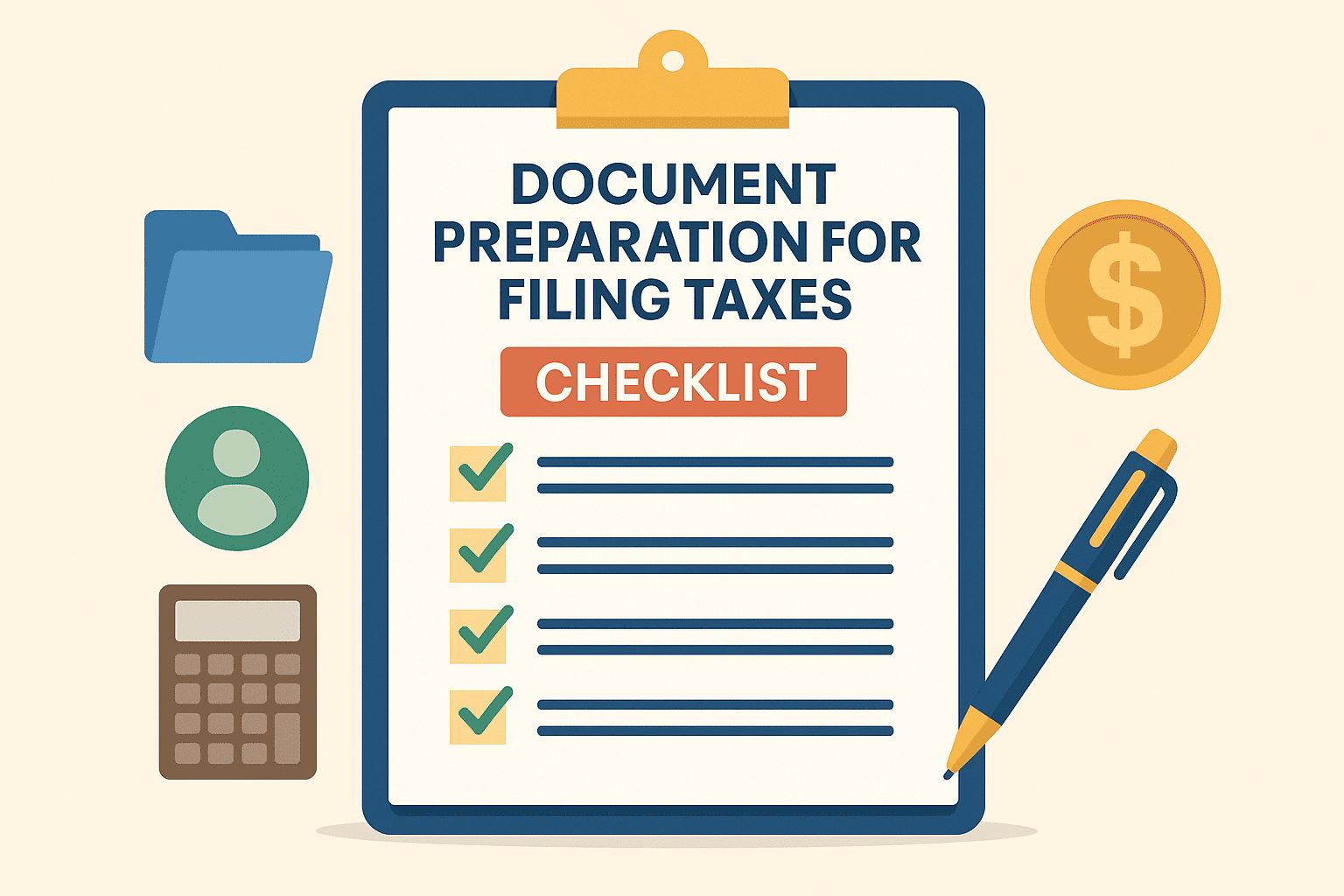
Document Preparation for Filing Taxes: A Checklist That Saves Time and Stress
Filing taxes in the U.S. isn’t just about punching numbers into a program — it’s about being organized before you even begin. Whether you're filing as an individual, self-employed, or running a business, knowing what documents you’ll need helps avoid delays, mistakes, and missed deductions.
This practical checklist will help you gather everything you need to file accurately — and with peace of mind.

🔹 Personal Information
Before anything else, have these basics ready:
Full legal name and Social Security Number (SSN) or ITIN
Date of birth for you, your spouse, and any dependents
Bank routing and account number (for direct deposit/refund)
Prior year’s tax return (if available)
🔹 Income Documents
Depending on your situation, collect the forms that show how much you earned:
W-2 from employers
1099-NEC or 1099-K (for contractors, freelancers, or side gigs)
1099-INT/1099-DIV (interest or dividends from bank accounts or investments)
1099-B (stock sales, crypto trades, etc.)
Schedule K-1 (if you have partnership, S-Corp, or trust income)
SSA-1099 (if receiving Social Security)
Unemployment income (1099-G)
Rental income and related records
Other income: alimony, gambling winnings, jury duty, etc.
🔹 Deductions & Credits
This is where tax savings happen. Bring all documents that could reduce your taxable income:
Childcare expenses (including provider’s name, address, and EIN/SSN)
Education expenses (Form 1098-T for tuition, 1098-E for student loan interest)
Mortgage interest (Form 1098)
Property taxes and real estate taxes
Medical expenses, if itemizing
Charitable donations (with receipts)
IRA or HSA contributions
Self-employment expenses: mileage, home office, equipment, software, phone, etc.
Health insurance premiums (especially for self-employed)
State and local taxes paid
Energy-efficient home upgrades (e.g. solar credits)
🔹 Business or Self-Employed? Additional Items
If you own a business or are self-employed, bring:
Income and expense report (Profit & Loss)
Bank and credit card statements
1099s issued to others (if you hired contractors)
Asset purchases or equipment depreciation records
Payroll records (if you have employees)
Vehicle logs (if using a car for business)
Business licenses or EIN documentation
🔹 Other Key Forms & Notices
Form 1095-A if you bought health insurance on the Marketplace
Any IRS letters (e.g., CP2000, audit notices, stimulus payments received)
Identity Protection PIN (if assigned by IRS)
Foreign account info (if required to file FBAR or FATCA)
Bonus Tip: Don’t Wait Until the Last Minute
Even if your tax situation seems simple, pulling everything together takes time. The earlier you gather your documents, the sooner your CPA or tax professional can spot any red flags or opportunities to save.
Ready to File with Confidence?
If you need help organizing your documents or aren’t sure what applies to you, Svetlana Gadzhieva, CPA and EA, is here to guide you through every step — in plain English or Russian.
She works with individuals, families, freelancers, small businesses, and investors across all 50 states.
🌐 Website: gadzhieva.com
📧 Email: svetlana@gadzhieva.com
📱 Phone: (510) 974-3115
💬 Telegram: https://t.me/Svetlana_CPA
📸 Instagram: @gadzhievacpa
💼 LinkedIn: Svetlana Gadzhieva, CPA